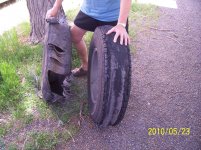TireHobby
Well-known member
As some of you may know I use a number of different names in the numerous RV forums I join and participate in. I follow the RV trailer tire threads and have compiled a large inventory of reference material. I’m not an engineer nor have I ever worked in the tire industry. However, I have worked in the rubber industry. I was formally trained while in the military on breaks - all types - and the various hydraulic/pneumatic systems that power them and wheels and tires. I was also a certified instructor in those items. So my observations of RV trailer tires are not from a complete novice.
Although the GY G614 tire is certified as a Light Truck tire it is still basically designed for use on trailer axles. Being a steel cased (unisteel) tire it only has a four year warranty. Being designed for the trailer axles it will have many of the same chemical compounds as the Special Trailer tire and will degrade faster than the Passenger or LT tire, especially when operating close to it’s maximum load capacity. Because it’s an LT tire many RV trailer owners want (do) to apply the load inflation chart and feel it will prolong their tires life. Remember, this is a trailer tire and it needs every pound of load capacity it has available to prolong It’s life. Besides, what base pressure would you use to establish a point on the load inflation chart. Did the RV MFG recommend 110 psi on the tire placard? There is no safe lower place to go to.
The bottom line with the G614 is it’s a very good tire when operated within the parameters set by the tire manufacturer. The major problem seems to occur when the RV manufacturer does not allow the G614 to have enough reserve load capacity. When used on the 7000# axles that are carrying very close to maximum axle loads the G614 is failing early and often. When the G614 has more than 400# of reserve load capacity per position it seems to be lasting out to and beyond it’s warranty period.
That’s just food for thought guys/gals. Almost all RV trailers can hold thousands of pounds above their GVWR. Most owners don’t even know when they are overweight. Unless you have weighed it somewhere along your journeys you just might be over. We were when we first weighed ours. Full timers and weekenders with kids want to carry the “kitchen sink”. LOL!
TireHobby
Although the GY G614 tire is certified as a Light Truck tire it is still basically designed for use on trailer axles. Being a steel cased (unisteel) tire it only has a four year warranty. Being designed for the trailer axles it will have many of the same chemical compounds as the Special Trailer tire and will degrade faster than the Passenger or LT tire, especially when operating close to it’s maximum load capacity. Because it’s an LT tire many RV trailer owners want (do) to apply the load inflation chart and feel it will prolong their tires life. Remember, this is a trailer tire and it needs every pound of load capacity it has available to prolong It’s life. Besides, what base pressure would you use to establish a point on the load inflation chart. Did the RV MFG recommend 110 psi on the tire placard? There is no safe lower place to go to.
The bottom line with the G614 is it’s a very good tire when operated within the parameters set by the tire manufacturer. The major problem seems to occur when the RV manufacturer does not allow the G614 to have enough reserve load capacity. When used on the 7000# axles that are carrying very close to maximum axle loads the G614 is failing early and often. When the G614 has more than 400# of reserve load capacity per position it seems to be lasting out to and beyond it’s warranty period.
That’s just food for thought guys/gals. Almost all RV trailers can hold thousands of pounds above their GVWR. Most owners don’t even know when they are overweight. Unless you have weighed it somewhere along your journeys you just might be over. We were when we first weighed ours. Full timers and weekenders with kids want to carry the “kitchen sink”. LOL!
TireHobby

